
Agriculture
February 6, 2024
Chameleon Soil Moisture Sensor
Read SolutionImplemented by
Australian Centre for International Agricultural Research
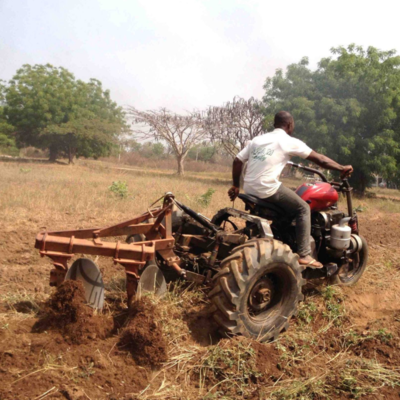
Updated on June 22, 2024
·Created on July 11, 2016
The Tryctor is a mini tractor in Nigeria that carries out several farming operations and is capable of being used as a generator.
The Tryctor is a three-wheeled mini tractor adapted from a traditional motorcycle design that provides transport and power for farmers. Various farming implements can be attached as the Tryctor is designed to carry out different farming operations similar to a conventional tractor but on a smaller scale. It also provides a useful means of transportation to convey produce. It was developed in collaboration with the National Centre for Agricultural Mechanization (NCAM) in Nigeria.
Target SDGs
SDG 2: Zero Hunger
SDG 9: Industry, Innovation and Infrastructure
Market Suggested Retail Price
$3,880.00
Target Users (Target Impact Group)
Small and Medium-sized Enterprises
Distributors / Implementing Organizations
Bespoke Design Concepts is the operating distributor.
Competitive Landscape
Direct competitors include Motivo HARVEST Electric Tractor and AgRover.
Countries
Nigeria
Manufacturing/Building Method
The product is manufactured in Kwara State, Nigeria, with the manufacturer offering custom colours, stencilling and a variety of custom made parts depending on requirements. The component parts are sourced, produced, fabricated and locally assembled.
Intellectural Property Type
Trademark
User Provision Model
This product is provided directly from the manufacturer. They also target farming cooperatives that normally have better buying power than single farmers.
Distributions to Date Status
7 prototypes have been distributed.
Engine Power
30 HP
Fuel Economy
6 litres / hectare
Fuel types
Diesel
Payload (kg)
The trailer payload is ~900 kg
Top Speed (mph)
Unknown
Design Specifications
The Tryctor is a 3-wheel mini tractor, suitable for farming with tyres for rough terrain and a 30-horsepower engine that can be used as a generator. Supplied with a disc plough, harrow and trailer, it performs similarly to a conventional tractor but to a smaller scale. It has a high strength steel chassis, fuel tank with a 15 litre capacity and an efficiency of 6 litres/hectare.
Technical Support
Support is provided by the manufacturer.
Replacement Components
In country repair and replacement available.
Lifecycle
The manufacturer offers a 2-year warranty.
Manufacturer Specified Performance Parameters
The manufacturer aims to provide accessible, multipurpose and affordable mini tractors for the development of Nigeria’s agricultural sector.
Vetted Performance Status
The product has been the result of years of continuous research and development efforts between NCAM (National Centre for Agricultural Mechanization) and Bespoke Design Concepts Limited who developed a series of prototypes before confirming the final design. The tests considered cost and performance in various farming activities.
Safety
Driver's negligence represents one of the main hazards during product operation
Complementary Technical Systems
Threshers and plows can be added, along with other tools traditionally attached to tractors and farming utility vehicles.
Academic Research and References
Asoegwu, S., Nwakuba, N. and Ohanyere, S., 2018, “Effective Use of Indigenous Farm Machinery and Implements in Soil Tilling, Planting and Weeding in Nigeria,” Ama, Agricultural Mechanization in Asia, Africa & Latin America, 49(2).
Ezekiel, O., 2018, “Mechanization for Smallholder Farming: an Indispensable tool for Economic Diversification,” Proceedings of Feed the Future Nigeria Agricultural Policy Project, International Food Policy Research Institute, Nigeria.
Douglas, K., 2016, Meet the Tryctor: A motorbike-turned-tractor targeting small farmers in Nigeria, How we made it in Africa
Compliance with regulations
The product is currently being prototyped. Internal standards have not been cited.
Evaluation methods
The product has undergone years of continuous research and development efforts, testing considered cost and performance in various farming activities.

Agriculture
February 6, 2024
Implemented by
Australian Centre for International Agricultural Research
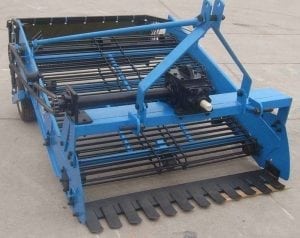
Agriculture
August 29, 2024
Implemented by
Weifang Public Machinery Co., Ltd.
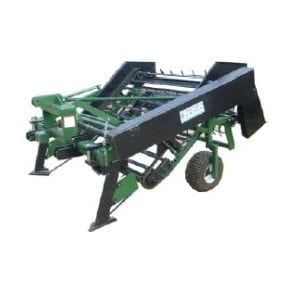
Agriculture
August 29, 2024
Implemented by
Alvan Blanch
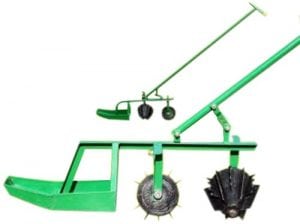
Agriculture
September 12, 2024
Implemented by
KSNM
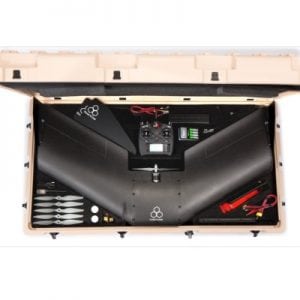
Agriculture
June 11, 2024
Implemented by
Honeycomb

Agriculture
June 12, 2024
Implemented by
Parrot
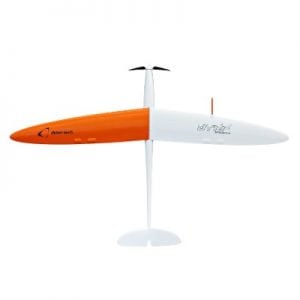
Agriculture
June 12, 2024
Implemented by
Delair Tech

Agriculture
June 11, 2024
Implemented by
Trringo
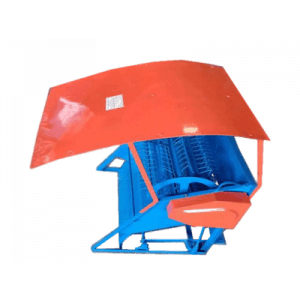
Agriculture
February 2, 2024
Implemented by
Agro Vision
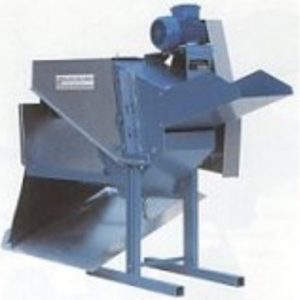
Agriculture
September 18, 2024
Implemented by
Alvan Blanch
Have thoughts on how we can improve?
Give Us Feedback
These are both interesting concepts with potential for positive impact on communities but also for improvement of the product. Some comments below.
Tryctor: As reference, motorcycles converted to “tractors” are being sold from organized companies and local workshops in India, the following comments are base on experience with those products. Farmers are attracted to this option because it can be had for about half the price of a conventional small tractor from a major manufacturer. The motorcycle-tractor will usually be made with a mix of repurposed, widely-available old and new parts in an effort to reduce cost (and the buyer is aware of this). In agricultural usage the motorcycle-tractor will usually underperform against a conventional small tractor in drawbar capabilities and ease-of-use. For Tryctor, it would be useful to show a performance and cost comparison vs. other farming options (e.g. conventional tractor, oxen/horse, power tiller, etc.). Include drawbar pull, turning radius, capital cost, operating cost, and field capacity.
Motivo HARVEST: A battery bank that can be easily charged from multiple commonly-available sources and can be conveniently transported/interfaced-to-a-tractor is an important differentiator of the product. It may be useful to state the “fuel economy” also in terms of hours at constant, stated wheel-power or PTO-power. A price point of 2.5 times the cost of a conventional, comparable tractor may dissuade many farmers and tractor rental entrepreneurs (who could purchase a bigger fleet of conventional tractors for the same price), especially since there is strong competition in that price range from major manufacturers. If ownership costs are lower (or yearly earnings higher) than a conventional tractor, show that and describe in more detail how a farmer/entrepreneur could finance the purchase (the mentioned “SMS credit” and “Zip Car like system”) better than with existing tractors. Also, discuss the usable lifetime of the product and how it compares to other options available to farmers. Discuss any effects on performance from this conversion to electric (tractive efficiency, turning radius, drawbar pull, ground pressure, etc.).